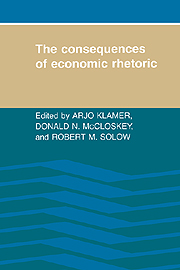Book contents
- Frontmatter
- Contents
- Preface
- The consequences of economic rhetoric
- PART I ECONOMIC RHETORIC: INTRODUCTION AND COMMENTS
- PART II ECONOMIC RHETORIC: FURTHER ARGUMENTS
- PART III ECONOMIC RHETORIC AMONG ECONOMISTS
- PART IV ECONOMIC RHETORIC IN POLITICS AND JOURNALISM
- PART V ECONOMIC RHETORIC: ITS RHETORIC AND ITS CONSEQUENCES
- 17 Negotiating a new conversation about economics
- 18 The consequences of rhetoric
- 1 Appendix: Other contributors and participants
- Index
18 - The consequences of rhetoric
Published online by Cambridge University Press: 07 September 2010
- Frontmatter
- Contents
- Preface
- The consequences of economic rhetoric
- PART I ECONOMIC RHETORIC: INTRODUCTION AND COMMENTS
- PART II ECONOMIC RHETORIC: FURTHER ARGUMENTS
- PART III ECONOMIC RHETORIC AMONG ECONOMISTS
- PART IV ECONOMIC RHETORIC IN POLITICS AND JOURNALISM
- PART V ECONOMIC RHETORIC: ITS RHETORIC AND ITS CONSEQUENCES
- 17 Negotiating a new conversation about economics
- 18 The consequences of rhetoric
- 1 Appendix: Other contributors and participants
- Index
Summary
The Last Word suggests a rhetoric of “bringing the conversation to a conclusion.” A conclusion would be too ambitious here. After all, aside from the trickle of anticipations by Robert Clower, Albert Hirschman, Mark Perlman, and a few others it has only been a while that economists have thought about words like rhetoric, conversation, and the social structure of scientific discourse. We are just beginning an economic criticism, as in “literary criticism,” giving new readings of economics and maybe of the economy, too. A handful of people have tried to write criticism, some in this book. But the arbitrage between economics and the rest of the culture has only just begun.
So wait and see. At present it would be premature for advocates of the rhetorical approach to erect Conclusions for all time. Likewise, it would be premature for those who now consider themselves as its opponents – we live in hope they will realize soon that they are its natural allies – to throttle the infant in its cradle. Their rhetoric has been “Show me now sixty full and finished pieces of literary criticism of economics, or I won't take it seriously.” We can show them six or ten or maybe twenty, and daily we produce more. Each day another economist sees that economics deserves a richer technique of reading than a three-by-five-card philosophy of science. It dawns on us that that those people in English and linguistics and communication studies cannot really all be idiots unworthy of attention.
- Type
- Chapter
- Information
- The Consequences of Economic Rhetoric , pp. 280 - 294Publisher: Cambridge University PressPrint publication year: 1989
- 8
- Cited by



